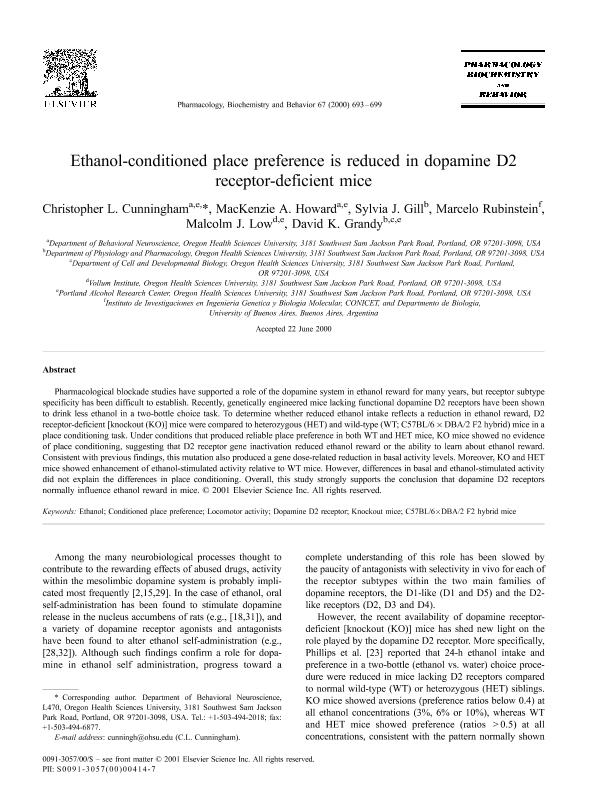Mostrar el registro sencillo del ítem
dc.contributor.author
Cunningham, Christopher L.
dc.contributor.author
Howard, MacKenzie A.
dc.contributor.author
Gill, Sylvia J.
dc.contributor.author
Rubinstein, Marcelo

dc.contributor.author
Low, Malcolm J.

dc.contributor.author
Grandy, David K.

dc.date.available
2019-03-14T20:57:28Z
dc.date.issued
2000-12
dc.identifier.citation
Cunningham, Christopher L.; Howard, MacKenzie A.; Gill, Sylvia J.; Rubinstein, Marcelo; Low, Malcolm J.; et al.; Ethanol-conditioned place preference is reduced in dopamine D2 receptor-deficient mice; Pergamon-Elsevier Science Ltd; Pharmacology Biochemistry and Behavior; 67; 4; 12-2000; 693-699
dc.identifier.issn
0091-3057
dc.identifier.uri
http://hdl.handle.net/11336/71726
dc.description.abstract
Pharmacological blockade studies have supported a role of the dopamine system in ethanol reward for many years, but receptor subtype specificity has been difficult to establish. Recently, genetically engineered mice lacking functional dopamine D2 receptors have been shown to drink less ethanol in a two-bottle choice task. To determine whether reduced ethanol intake reflects a reduction in ethanol reward, D2 receptor-deficient [knockout (KO)] mice were compared to heterozygous (HET) and wild-type (WT; C57BL/6 × DBA/2 F2 hybrid) mice in a place conditioning task. Under conditions that produced reliable place preference in both WT and HET mice, KO mice showed no evidence of place conditioning, suggesting that D2 receptor gene inactivation reduced ethanol reward or the ability to learn about ethanol reward. Consistent with previous findings, this mutation also produced a gene dose-related reduction in basal activity levels. Moreover, KO and HET mice showed enhancement of ethanol-stimulated activity relative to WT mice. However, differences in basal and ethanol-stimulated activity did not explain the differences in place conditioning. Overall, this study strongly supports the conclusion that dopamine D2 receptors normally influence ethanol reward in mice.
dc.format
application/pdf
dc.language.iso
eng
dc.publisher
Pergamon-Elsevier Science Ltd

dc.rights
info:eu-repo/semantics/openAccess
dc.rights.uri
https://creativecommons.org/licenses/by-nc-sa/2.5/ar/
dc.subject
C57bl/6&Times;Dba/2 F2 Hybrid Mice
dc.subject
Conditioned Place Preference
dc.subject
Dopamine D2 Receptor
dc.subject
Ethanol
dc.subject
Knockout Mice
dc.subject
Locomotor Activity
dc.subject.classification
Inmunología

dc.subject.classification
Medicina Básica

dc.subject.classification
CIENCIAS MÉDICAS Y DE LA SALUD

dc.title
Ethanol-conditioned place preference is reduced in dopamine D2 receptor-deficient mice
dc.type
info:eu-repo/semantics/article
dc.type
info:ar-repo/semantics/artículo
dc.type
info:eu-repo/semantics/publishedVersion
dc.date.updated
2019-03-14T14:16:15Z
dc.journal.volume
67
dc.journal.number
4
dc.journal.pagination
693-699
dc.journal.pais
Estados Unidos

dc.journal.ciudad
Amsterdam
dc.description.fil
Fil: Cunningham, Christopher L.. University of Oregon; Estados Unidos
dc.description.fil
Fil: Howard, MacKenzie A.. University of Oregon; Estados Unidos
dc.description.fil
Fil: Gill, Sylvia J.. University of Oregon; Estados Unidos
dc.description.fil
Fil: Rubinstein, Marcelo. Consejo Nacional de Investigaciones Científicas y Técnicas. Instituto de Investigaciones en Ingeniería Genética y Biología Molecular "Dr. Héctor N. Torres"; Argentina
dc.description.fil
Fil: Low, Malcolm J.. University of Oregon; Estados Unidos
dc.description.fil
Fil: Grandy, David K.. University of Oregon; Estados Unidos
dc.journal.title
Pharmacology Biochemistry and Behavior

dc.relation.alternativeid
info:eu-repo/semantics/altIdentifier/doi/https://doi.org/10.1016/S0091-3057(00)00414-7
dc.relation.alternativeid
info:eu-repo/semantics/altIdentifier/url/https://www.sciencedirect.com/science/article/pii/S0091305700004147
Archivos asociados
